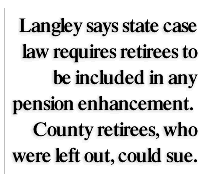How To Kill Ament’s Pension
Now that the mainstream media is having a feeding frenzy over the pension story I first broke back in October, Milwaukee County Executive F. Thomas Ament has gotten religion. Ament has proposed a rollback of the outrageous pension benefits owed to him and others. That sounds good, but it’s not likely to happen. The only chance for overturning the law is a suit by county retirees.
 Pension benefits, once awarded, are not easily taken away, according to Nick Griefer, a policy analyst for the Government Finance Officers Association, a national organization that advises governments on fiscal matters. Griefer says that governments can always change the benefits for future employees they hire but have a more difficult time changing benefits given to current employees. Jake Lorentz of the National Association of State Retirement Administrators, agrees: “Usually, when benefit changes happen, it only affects the new employees.”
Pension benefits, once awarded, are not easily taken away, according to Nick Griefer, a policy analyst for the Government Finance Officers Association, a national organization that advises governments on fiscal matters. Griefer says that governments can always change the benefits for future employees they hire but have a more difficult time changing benefits given to current employees. Jake Lorentz of the National Association of State Retirement Administrators, agrees: “Usually, when benefit changes happen, it only affects the new employees.”
GFOA publishes “An Elected Official’s Guide to Public Retirement Plans,” which says “the laws governing state and local government pension plans generally extend a contractual right to plan participants and retirees guaranteeing that a pension, either current or future, will not be impaired or diminished.”
Wisconsin statute 40.19 says that the once the legislature offers benefits to state employees, they “shall accrue as a contractual right” and “shall not be abrogated by any subsequent legislative act.” Terry Mason, Legislative Fiscal Bureau analyst, says “the statutes allow the legislature to take away benefits, but only if they give you something of equal value.”
Bill Ford, staff attorney for the state Legislative Council, says that “once a benefit is vested, it becomes a property right. That’s why careful review of this type of legislation is so important. Because once you do it, it’s hard to revise it.”
It goes without saying that the county did not do a careful review. And the language of the county resolution, which accelerates the vesting for employees hired after 1982 along with offering the huge increase in pensions for old timers like Ament, suggests the benefit was meant to be vested. Ultimately, this would come down to how the courts interpret the resolution.
But any judge who tried to overturn the resolution would be left with a mess. For starters, of the 1,394 employees who started with the county before 1982 and are eligible for the generous “backdrop” pension provision, most are union employees. This negotiated benefit could not be overturned except through another round of collective bargaining, which the union has already ruled out.
That leaves two other groups, the “non-represented” employees and elected officials. Since the resolution passed by the county went into effect in January, 2001, some of the non-represented employees have already retired and collected backdrop payments of as much as $289,000 apiece. Can the county board now step in and end this for other employees? Would a court uphold this inequity?
That leaves the elected officials. Will an official like Sheriff Lev Baldwin, who has already announced his retirement, sit idly by if the board takes away his $480,000 backdrop payment? Or will he go to court, and sue to prevent this? In a similar situation in Nevada, after the legislature rolled back pension payments to its members, some legislators went to court to sue for their original benefits.
 Back when the pension resolution was passed, every county elected official eligible for this golden parachute “wanted to see it happen,” County Supervisor Robert Krug says. So far, except for Ament, no other official has offered to forego their fat new pension benefit. And should Ament be recalled or defeated in his reelection bid, he too may change his mind about cashing in on his backdrop benefit.
Back when the pension resolution was passed, every county elected official eligible for this golden parachute “wanted to see it happen,” County Supervisor Robert Krug says. So far, except for Ament, no other official has offered to forego their fat new pension benefit. And should Ament be recalled or defeated in his reelection bid, he too may change his mind about cashing in on his backdrop benefit.
But there is one possible legal flaw in the pension plan. They left out the county retirees. A pension plan is something that gives contractual rights to all participants and nearly half of those in the county’s plan retired before this resolution was passed. This huge group of people, some 7,000 strong, got nothing from the pension enhancement plan. They could go to court to argue that the millions going to Ament and others are coming out of a fund to which they have equal rights.
Ford, however, notes that state law discourages giving increased pension benefits to retired employees, and in fact requires a three-fourths majority of the legislature to approve such increases. While the county runs its own pension system, all counties are instrumentalities of the state and state statutes might be considered for guidance in interpreting a county ordinance. “They could sue,” Ford notes of Milwaukee County retirees. “But given the rule discouraging increases for retired state employees, this is not a slam dunk.” Perhaps, but it’s clearly the best chance of legally overturning the outrageous county pension law.
Short Take
Gubernatorial candidate and state Sen. Gary George got some supposedly negative publicity about billboards he purchased that list his name backwards as “George Gary.” His campaign consultant Dave Begel couldn’t explain how the error occurred but seemed pretty jolly about the whole thing. And why not? George got coverage on everything from Paul Harvey’s syndicated radio show to television stations in Milwaukee and elsewhere. It was brilliant publicity gimmick, and I have no doubt that Begel did this deliberately. George has had trouble standing out from the pack of Democratic candidates, but on last night’s TV stations everyone was repeating his name again and again to make it clear that its not George Gary but Gary George.
Murphy's Law
-
National Media Discovers Mayor Johnson
 Jul 16th, 2024 by Bruce Murphy
Jul 16th, 2024 by Bruce Murphy
-
Milwaukee Arts Groups in Big Trouble
 Jul 10th, 2024 by Bruce Murphy
Jul 10th, 2024 by Bruce Murphy
-
The Plague of Rising Health Care Costs
 Jul 8th, 2024 by Bruce Murphy
Jul 8th, 2024 by Bruce Murphy





















